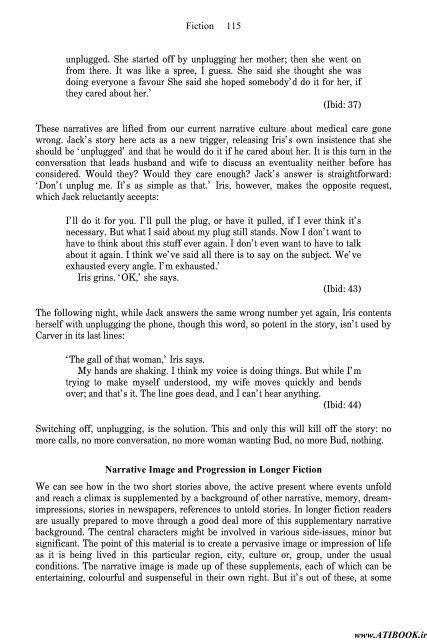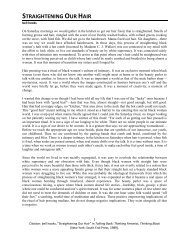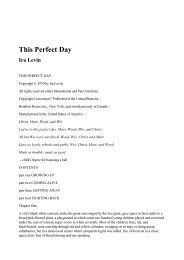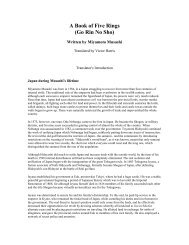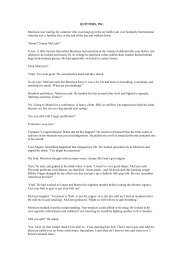www.ATIBOOK.irFiction 115unplugged. She started off by unplugging her mo<strong>the</strong>r; <strong>the</strong>n she went onfrom <strong>the</strong>re. It was like a spree, I guess. She said she thought she wasdoing everyone a favour She said she hoped somebody’d do it for her, if<strong>the</strong>y cared about her.’(Ibid: 37)These narratives are lifted from our current narrative culture about medical care gonewrong. Jack’s story here acts as a new trigger, releasing Iris’s own insistence that sheshould be ‘unplugged’ and that he would do it if he cared about her. It is this turn in <strong>the</strong>conversation that leads husband and wife to discuss an eventuality nei<strong>the</strong>r before hasconsidered. Would <strong>the</strong>y? Would <strong>the</strong>y care enough? Jack’s answer is straightforward:‘Don’t unplug me. It’s as simple as that.’ Iris, however, makes <strong>the</strong> opposite request,which Jack reluctantly accepts:I’ll do it for you. I’ll pull <strong>the</strong> plug, or have it pulled, if I ever think it’snecessary. But what I said about my plug still stands. Now I don’t want tohave to think about this stuff ever again. I don’t even want to have to talkabout it again. I think we’ve said all <strong>the</strong>re is to say on <strong>the</strong> subject. We’veexhausted every angle. I’m exhausted.’Iris grins. ‘OK,’ she says.(Ibid: 43)The following night, while Jack answers <strong>the</strong> same wrong number yet again, Iris contentsherself with unplugging <strong>the</strong> phone, though this word, so potent in <strong>the</strong> story, isn’t used byCarver in its last lines:‘The gall of that woman,’ Iris says.My hands are shaking. I think my voice is doing things. But while I’mtrying to make myself understood, my wife moves quickly and bendsover; and that’s it. The line goes dead, and I can’t hear anything.(Ibid: 44)Switching off, unplugging, is <strong>the</strong> solution. This and only this will kill off <strong>the</strong> story: nomore calls, no more conversation, no more woman wanting Bud, no more Bud, nothing.Narrative Image and Progression in Longer FictionWe can see how in <strong>the</strong> two short stories above, <strong>the</strong> active present where events unfoldand reach a climax is supplemented by a background of o<strong>the</strong>r narrative, memory, dreamimpressions,stories in newspapers, references to untold stories. In longer fiction readersare usually prepared to move through a good deal more of this supplementary narrativebackground. The central characters might be involved in various side-issues, minor butsignificant. The point of this material is to create a pervasive image or impression of lifeas it is being lived in this particular region, city, culture or, group, under <strong>the</strong> usualconditions. The narrative image is made up of <strong>the</strong>se supplements, each of which can beentertaining, colourful and suspenseful in <strong>the</strong>ir own right. But it’s out of <strong>the</strong>se, at some
www.ATIBOOK.irThe <strong>routledge</strong> <strong>creative</strong> <strong>writing</strong> <strong>coursebook</strong> 116point, that <strong>the</strong> main story develops, moves to its crisis. A slowly narrowing vortex ofaction brings <strong>the</strong> main characters toge<strong>the</strong>r, draws <strong>the</strong>m out of <strong>the</strong>ir separate lives towardsa position that will see those lives closely entwined. With escape routes cut off,confrontation follows. The aim of <strong>the</strong> writer will be to find a way of drawing his or hercharacters to this point of narrative progression, and one that is consistent with <strong>the</strong> overallnarrative image, with <strong>the</strong> way life is being lived by people like this in this part of <strong>the</strong>world at this particular time. A major event: wedding, funeral, feast, reunion, or adeparture of some kind, imposes a structure on <strong>the</strong> lives of <strong>the</strong> characters, forcing <strong>the</strong>m toadopt a position towards it and each o<strong>the</strong>r. One of <strong>the</strong> best examples of this structure isJonathan Franzen’s novel The Corrections, where bro<strong>the</strong>rs and sisters meet for a lastfamily Christmas toge<strong>the</strong>r. It’s also used by Roddy Doyle in The Woman Who WalkedInto Doors and Paddy Clark Ha Ha Ha, a novel where progression is delayed, for goodreasons, until quite late on in <strong>the</strong> story. In <strong>the</strong> stories by Kay and Carver, one character(Melanie’s fa<strong>the</strong>r, and <strong>the</strong> woman on <strong>the</strong> phone) have been removed completely from <strong>the</strong>scene, and <strong>the</strong> gap generates focus and interest. In Doyle’s novel, Paddy Clark’s storyends when his fa<strong>the</strong>r returns, now separated from <strong>the</strong> family, for a visit. But Paddy’schildhood has now come to an end, with a major shift of lives.Fiction and AnecdoteMany writers draw on <strong>the</strong>ir own experience as sources for fiction, and <strong>the</strong>re are clearparallels between fiction <strong>writing</strong> and personal narrative. But at some point we will needto acknowledge a distinction between fiction and o<strong>the</strong>r literary forms of narrative, as wellas between <strong>the</strong>se and non-literary forms such as <strong>the</strong> anecdote. Can we discuss <strong>the</strong>se formsin terms of differences of content, or should we focus instead on <strong>the</strong>ir differenttechniques? Suppose, for example, that you have just failed your driving test for <strong>the</strong> thirdtime and are telling your friends about it. If you <strong>the</strong>n used this material in a short story,would you intend to shape <strong>the</strong> narrative differently, produce a more literary style, usethird-person ra<strong>the</strong>r than first-person narrative? Or would your aim be to change <strong>the</strong>events <strong>the</strong>mselves, add to <strong>the</strong>m, subtract from <strong>the</strong>m? What would you alter to make itsound like fiction?My suspicion is that readers expecting a short story would not be wholly satisfied if<strong>the</strong>y found <strong>the</strong>mselves reading about your driving test, however brilliantly you expressedyour version of events. The reasons behind my suspicion derive from <strong>the</strong> notion thatnarratives, like language itself, always operate within a social context. The social contextof anecdote involves certain specific aims and conditions: <strong>the</strong> speaker is helping a knowngroup of friends and associates to catch up on some recent information about his or herown life, on what has recently been happening to <strong>the</strong> speaker—<strong>the</strong> next installment, as itwere. The context will also suggest that those listening could follow up with anecdotes of<strong>the</strong>ir own if <strong>the</strong>y wanted to; <strong>the</strong> context implies continuity. With anecdotes,communication continues after <strong>the</strong> telling, just as it was already established before it.Both <strong>the</strong>se conditions differ from those implied by fiction <strong>writing</strong>, where communicationhas not been established previously, will not continue afterwards, and does not rely on <strong>the</strong>listener’s or reader’s prior acquaintance with <strong>the</strong> settings and characters of <strong>the</strong> narrative.The fiction writer will inevitably be more interested in developing <strong>the</strong> message ormeaning of a piece for a general reader unknown to her or him personally. We are


